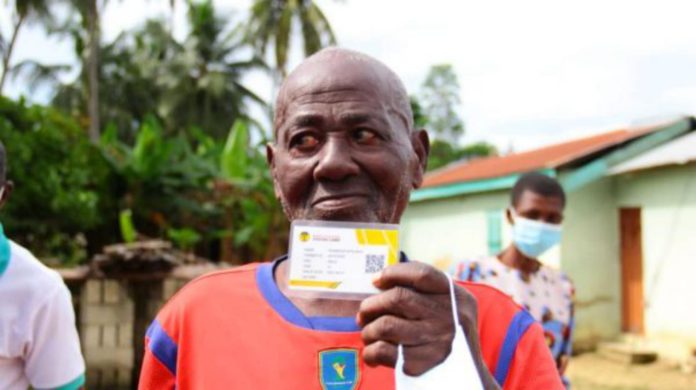A 103-year-old cocoa farmer, Opanyin Kwabena Nkrumah, is one of the first people to enrol on the Cocoa Farmer Pension Scheme, which is presently being piloted in the Ashanti Region.
The centenarian from Adansi Atobiase was among a group of cocoa farmers who went to the registration centre in the early hours of the first day of the registration exercise and were taken through the registration process.
Opayin Nkrumah expressed his delight at having gone through the process. He urged the younger generation of cocoa farmers to seize the opportunity to register with the scheme and make their contributions to secure a comfortable retirement.
“Look at me, at my age, I still harvest and sell cocoa. I have been farming for over 50 years. I still love cocoa farming and the pension scheme is a step in the right direction. We have been waiting for it for a long time and we are grateful to the government for it,” he said.
President Nana Akufo-Addo last year launched the National Cocoa Farmers Pension Scheme in Kumasi and announced that it would be rolled out in October this year.
The scheme is a regulated one sponsored by the COCOBOD to cover registered cocoa farmers and their beneficiaries.
The scheme selected New Edubiase for the pilot project because it is the highest cocoa producing district in the Ashanti Region.
Scheme details
The ongoing pilot registration exercise will go on for 14 days. Within the period some 2,800 volunteer farmers will be enrolled on the scheme. The farmers will provide feedback to help improve the designed operational framework for the nationwide registration scheduled for October of this year.
During a visit to some of the pilot registration centres , the consultant to Stallion Trust, the fund administrators, Mr Arnold Mensa-Bonsu, expressed the belief that New Edubiase would be the best place for the trial.
Taking the farmers through the process, Mr Mensa-Bonsu said all farmers who went for the Cocoa Management System (CMS) and were issued with a card would contribute a maximum of five per cent of their cocoa sales to the fund, while COCOBOD would match it with one per cent contribution.
He said farmers were, however, at liberty to contribute more than that, and explained that out of the contribution, 25 per cent would be put into personal savings for the farmer, while the other 75 per cent would go into a retirement account.
While the personal savings could be accessed after five years of contribution, Mr Mensa-Bonsu said the retirement account could only the accessed upon retirement.
In the case of the personal savings account, he said, a farmer could access 25 per cent of the accrued sum after five years and 20 per cent after every two years.
He said the main qualification for the pension scheme was for one to be registered and issued with the Ghana Cocoa Card, saying it was the only means through which one could sell cocoa beans and be registered onto the scheme.
Mr Mensa-Bonsu said the card contained all the details of the farmer, including his or her farm size and could not be stolen and used by another person because “some of the information on the card is only known to the owner”.
So far, he said, all cocoa farmers in the Western North cocoa region had been registered onto the CMS, while registration in Ashanti was ongoing.
The CMS provides a database for the cocoa industry to track the contribution of farmers and to facilitate prompt payment of claims to beneficiaries.



